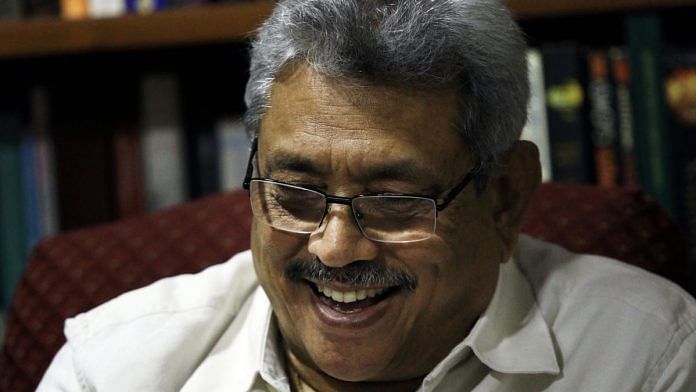Prime Minister Narendra Modi was the first to congratulate Sri Lanka’s freshly-elected president Gotabaya Rajapaksa, soon after the results of 16 November elections were declared. The former defence secretary, who remained in hot pursuit of the LTTE and finished off the Tamil terror group and the civil war in 2009, is now on the hot seat in Colombo.
Speculation is rife that Gotabaya’s brother, Mahinda Rajapaksa, will soon be the prime minister. Although parliamentary elections in the island are due only next year, in 2020, current PM Ranil Wickremesinghe can hardly continue, considering the vote has been against his party’s Sajith Premadasa, who won 42 per cent of the votes, 10 per cent less than Gotabaya’s tally.
When Wickremesinghe resigns, Mahinda will take his place – or so goes the rumour mill in Sri Lanka.
If and when that happens, the rule of the Rajapaksas will be complete. They will rule their country with an iron hand. Democracy will acquire a distinct nationalist edge. The Chinese, whom Mahinda Rajapaksa invited to the island with open arms when he was the president, will be even more established.
The first three points, actually, run astonishingly parallel to political developments in India. Not only has Narendra Modi ruled India with a firm grip since he became PM, his version of democracy is far more nationalist than ever before.
Still, it would be too simplistic to say that Modi and the Rajapaksas are like peas in a pod – although both strong men don’t hesitate to take action against ethnic and religious communities in their own countries.
Also read: India need not fear Rajapaksa’s win and Sri Lanka’s embrace of China
A decade of peace in Sri Lanka
Fact is, it was the Manmohan Singh government in 2009, which looked the other way when brothers Mahinda and Gotabaya Rajapaksa finished off the LTTE. Several human rights violations were committed in that war, including the killing of women and children. But the civil conflict had dragged on for too long, since 1983. Delhi believed that the bloodshed must end, giving way to a new peace.
That is what, indeed, happened. For 10 years, until the Easter attack in April 2019 in which more than 300 people were killed, Sri Lanka was peaceful. The tourists returned. Mahinda Rajapaksa was president for half that time, during which he laid out the red carpet for the Chinese. New Delhi saw that as Rajapaksa thumbing his nose at India. He lost power soon after, in 2015.
Nearly five years later, the Rajapaksas are back. In the interim, Sri Lanka has been wracked by several power struggles – so much so that until three weeks ago, 70-year-old Wickremesinghe was unwilling to let the 52-year-old Sajith Premadasa become the party candidate to fight Gotabaya. There is another outcome of the 2019 polls: the baton has after several decades passed on from Wickremesinghe to a younger generation.
So, is New Delhi concerned that the Rajapaksas are back and will take revenge for being pushed out of Temple Trees (the official residence of the Sri Lanka president/PM) in 2015? The answer, as always, lies in whether you are looking at the glass being half-full or half-empty.
Also read: Another strongman Rajapaksa returns to Sri Lanka, raising fears of tilt to China
It’s wait & watch for India, Sri Lanka
First, India must deal with the situation as it exists on the ground, and not as it wants it to be.
Gotabaya Rajapaksa was able to reap the fear that was the outcome of the Easter attacks and leveraged his strongman image to tell Sri Lanka that he was the better man to deal with the situation. With a local Islamist terror group having carried out the attacks, ties between Sinhalese and Muslims are also fraying, especially in the Eastern Province.
India understands that; it has no particular problem with it.
Second, Mahinda Rajapaksa may have warmly welcomed the Chinese into Sri Lanka a few years ago and asked them to help build the Hambantota port as well as a new port city in Colombo.
Today, though, it is unclear if the Rajapaksas will openly push a pro-China policy. Remember Gotabaya’s pro-India section in his election manifesto and the call Modi made to him following his victory, signalling in no uncertain terms that New Delhi accepts his overlordship in Sri Lanka.
But the Rajapaksas will be careful to see how the cookie crumbles in the Indian Ocean for another reason, which is to wait and see if India and the US are actually coming closer together to take on the Chinese.
If Modi, indeed, takes that call with Trump, it will signal another significant change in India’s foreign policy. In that case, the Rajapaksas are bound to moderate their own policies towards a US-backed India.
Third, whether or not the Rajapaksas push for a greater mainstreaming of the Tamil population, Delhi will certainly continue to put its money where its mouth is.
Several thousand houses have been built in the Northern province, a new Indian cultural centre is is coming up and, most interestingly, an Alliance Air flight has resumed its Chennai to Jaffna service after 41 years (Rs 7,180 is the round trip ticket) only five days before Sri Lanka went to the polls on 16 November.
Certainly, the Indian Ocean has little respect for weak leaders. Come to think of it, after China’s Xi Jinping and Modi, Gotabaya Rajapaksa is the third strongman who successfully rode the high political tide in these waters. At least in the near future, he will be the only ruler of Sri Lanka.
Also read: ‘Like China, India should invest across Indo-Pacific to ensure regional security’




It will be in Sri Lanka’s interest not to disrespect India’s core concerns. Its economy cannot sustain another extravagant round of Chinese investment.